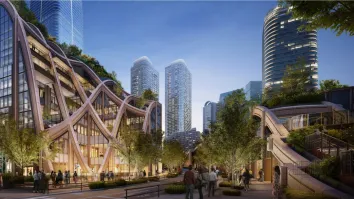
HK commercial property showing signs of recovering from 'record depression'
Commercial property rents are getting closer to a trough.
CBRE Hong Kong’s Regional Managing Director Tom Gaffney says Hong Kong commercial property prices are showing signs of recovery as property funds, family offices, and wealthy individuals have started buying in.
“We are seeing an almost record economic depression that we haven't seen in the last 20 years. This has led to meaningful correction in commercial property demand and prices. As a result, a lot of investor groups are starting to pile in recently. Most of the transactions have been from property funds, family offices, local end-users and developers,” he said.
“Recently we're starting to see more en-bloc transactions, suggesting both local and international investors strengthening their confidence over Hong Kong’s long-term future. Since the beginning of this year, we've seen nine en-bloc transactions being done, about half of which by some of the big foreign funds,” he added.
Gaffney also said the performance has been good as the firm has closed a total of over HK$5.7b (US$734m) worth of real estate since the start of 2021.
“We are seeing some very positive signs on the capital market side. This year alone has been a fantastic start for CBRE. I think we've already concluded 11 deals in our first 50 days this year, totaling in excess of HK$5.7b worth of real estate being transacted,” he said.
Gaffney has also observed that most family offices or private wealth have been lodged deals to commence as a way to make capital move.
“A lot of that is pent up demand, which some of the groups, mostly family offices or private wealth, have been looking to deploy capital and those who haven't been able to find the right deals in the last 20 months. However, I think expectations of vendors and buyers have started to meet in the middle and as a result deals are being done. The rental downcycle is about to reach a trough and this gives buyers’ confidence a boost as well. We foresee that trend to continue certainly in the first half of this year,” he said.
“I think the booming stock market has helped us a lot. In Hong Kong, in 2020, we had an excess of 154 IPOs and most of those did incredibly well. We had an excess of HK$450b of liquidity in the Hong Kong banking system. It's a lot of money being sloshed around, and so with a bullish stock market, we're hoping that more will be deployed to another fellow asset class being real estate,” he added.
Office rents to fall
Even as investors are starting to purchase Hong Kong commercial property at current values, office rent continues to fall by a slowing rate lately, and may not be able to rebound until post-2023.
According to Gaffney, not only is there a spike in vacant space and shadow space, which is leases being terminated, the upcoming new supply in the pipeline will create a huge overhang.
“It's really been a stop-start market for us in the last 20 or so months. If we break it down into the sectors, starting with office, we have seen office demand slow over that period of time, mostly led by the multinational sectors. Most impacted were the finance, insurance, and legal sectors. We've seen office rents drop around about 25% during that period of time and we're forecasting that will drop about another 5% to 10%, for the remaining portion of this year. The reason for that is given a lot of stock being handed back to the market, we're also going to be met with a huge amount of supply in 2023,” he said.
“We are seeing a lot of shadow space that's being handed back to the market, and also leases expiring in the next 12 months. That combined to add up to about 11 million square feet. So that's a lot of space. To put that in perspective, that's about the same size as Tsim Sha Tsui, which is one of our sub districts here in Hong Kong. In addition to a further 6 million square feet of new supply gradually to become available in 2022/2023, so in total, 17 million square feet of space are coming to the market. We expect that it's going to take a few years for the market to absorb the space before rents to start climbing again,” he added.
That said, CBRE HK sees pent-up demand in occupiers such as wealth management firms, recently listed Chinese enterprises, and those in professional services sectors.
“A lot of industries that are on the periphery of IPOs—whether it's legal, banking or accountancy—are starting to relook at the market and re-enter. Given that rents are so depressed, there are some really good deals to be done in the market, but we don't see that recovery to really happen until the second half of the year,” he said.
“So where we are seeing most of the demand is legal firms, which are taking up more space. Some of the Chinese national firms are starting to come back. We’re seeing the hedge funds are still expanding, as well as some of the private equity firms. We're also seeing some expansion demand from a few long-established co-working operators,” he added.
As for the retail sector, the market has been the most severely hit among all commercial property sectors due to travel restrictions and social distancing measures amid the ongoing pandemic across the world.
“Rents on the high street have been terribly affected. We're seeing probably the highest vacancy we've seen in the last three or four years of over 18% in the retail sector. We do foresee rents continuing to fall in the retail sector for 2021 by probably another 10 to 15%,” Gaffney said.
Gaffney sees that developers will continue to construct buildings catering to the education and healthcare sectors. Landlords are now seeing opportunity in pursuing these sectors and are welcoming these occupiers to its buildings as they adjust their real estate strategies, revise portfolio and upgrade the tenant mix.
“Sectors like education, health, and medical are becoming very prominent at the moment. We're starting to see some of the developers actually building buildings in Hong Kong that are almost tailored to medical centers or tailored to education. The landlords are now being forced to think about new and exciting new sectors, and it's going really well,” he said.
New occupiers in logistics
Industrial space has also seen an increased demand in the past year especially as business shifted to online platforms. Warehouses and storage gained new traction from the online retailing growth, which led to industrial rents dropping only as high as 6% in the past year.
“Logistics has probably been our darling sector for the last 18 to 20 months. A lot of demand is after industrial space as the pandemic kicked in while people ramped up on their warehousing and storage for online retailing,” Gaffney said.
“Also, with the diminishing amount of supply of industrial space in Hong Kong, it has helped maintain rental stability a lot. Overall, we only saw industrial rents drop around about zero to 6% in 2020,” he added.
CBRE HK observed that in the industrial sector, the tenant mix became more diverse. Cold storage, data centres, car dealers and pharmaceuticals have been most of their new occupiers.
“That's been an exciting sector in the last 20 months, where we've seen quite a lot of change in the tenant mix makeup. A lot more landlords are getting quite interested in cold storage, making it a really hot sector. Same with data centers and pharmaceuticals,” he said.
“Traditionally, landlords used to look to third-party logistics operators as the core occupier. They are now starting to shift away from that and they're willing to take longer term and invest more in the asset. As a result, the yields are a bit better. That’s something that we foresee will continue for the next 12 months,” he added.
For more information, subscribe now to Real Estate Asia's channels in Spotify and Apple podcasts.
(US$ 1 = HK$ 7.76)
Photo courtesy of CBRE HK.


















 Advertise
Advertise


